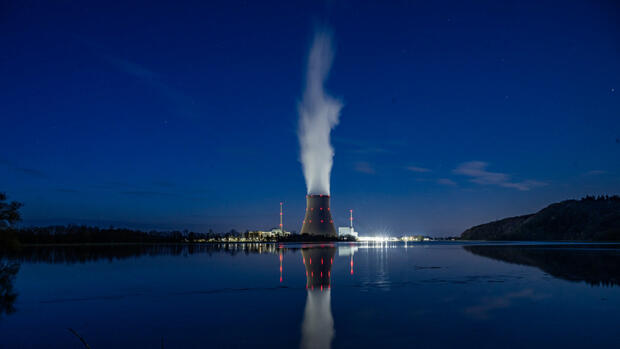According to the Atomic Energy Act, the final shutdown should take place on April 15.
(Photo: dpa)
Berlin Federal Minister of Economics Robert Habeck considers Germany’s imminent phase-out of nuclear energy to be irreversible, despite all resistance. After the shutdown on April 15, the last three power plants would “go into dismantling sooner or later,” the Greens politician told the newspapers of the Funke media group.
“And the construction of new nuclear power plants has always presented itself as an economic fiasco – whether in France, Great Britain or Finland.” The operators have no interest in that either.
However, a large majority of Germans are against phasing out nuclear energy at this point in time. In a survey by the opinion research institute YouGov on behalf of the German Press Agency, 65 percent were in favor of leaving the power plants running for the time being. The Union asked the federal government to reverse its exit decision.
The Meiler Isar 2, Emsland and Neckarwestheim 2 should actually have been taken off the grid at the end of last year. However, due to the Russian war of aggression against Ukraine and the resulting energy crisis, the traffic light coalition decided last year to let the last three power plants continue to run over the winter.
Next Saturday, however, they are to be finally shut down. This means that after more than 60 years, the generation of electricity from nuclear power in Germany has come to an end. In November 1960, the kiln in Kahl, Lower Franconia, was the first commercial nuclear power plant to go into operation.
FDP General Secretary accuses the Greens of being blockades
In the traffic light coalition, the FDP had vehemently opposed the shutdown of the last power plants. FDP General Secretary Bijan Djir-Sarai still thinks the step is wrong. From the point of view of the FDP, continued operation of the nuclear power plants would be necessary for energy security and to avoid coal-fired power. “It is unfortunate that the Greens are blocking and not showing any understanding. We should also discuss the chances of new and safer nuclear fission and nuclear fusion technologies with an open mind,” Djir-Sarai told dpa.
“Emergency situations like those recently caused by the Russian war of aggression against Ukraine cannot be reliably predicted,” explained the FDP politician. “That’s why we have to get away from an energy policy that is sewn to the brim.”
>> Read here: What to do with the radioactive waste from nuclear power plants?
CSU regional group chief Alexander Dobrindt called for leaving the door open for the continued use of nuclear energy. There is still the option of ordering new fuel rods for the three remaining reactors, so that they can be connected to the grid again next winter when there is a high energy demand. “That’s why I’m calling on the federal government to make the necessary decision on fuel procurement so that we don’t experience any blackouts next winter,” said Dobrindt.
Habeck: “We have the situation under control”
Habeck, on the other hand, emphasized that the energy supply was secure. “The security of energy supply in Germany was guaranteed in this difficult winter and will continue to be guaranteed,” he said. “We have the situation under control thanks to the high filling levels in the gas storage facilities and the new liquid gas terminals on the north German coasts, and not least thanks to more renewable energies.”
Green party leader Ricarda Lang told the dpa that recent studies have shown that renewable energies cost four times less to produce than nuclear power and protect against foreseeable increases in oil and gas prices in the long term. “With the clear focus on renewable energies, on wind and solar, also on hydrogen, the traffic light strengthens the competitiveness of Germany as an industrial location and creates future-proof jobs.”
Only the Greens voters majority for shutdown
In the YouGov poll, however, only 26 percent of respondents supported shutting down nuclear power plants now. 32 percent are in favor of the three remaining reactors continuing to run for a limited period of time. A further 33 percent are even in favor of extending the terms indefinitely.
There is only a majority for the immediate end of nuclear power in Germany among the supporters of the Greens with 56 percent. On the other hand, rejection prevails among voters of all other parties represented in the Bundestag. Of the left-wing supporters, only 37 percent are in favor of shutting down the reactor, followed by SPD voters with 31 percent, ahead of those of the CDU/CSU (16 percent), FDP (12 percent) and AfD (6 percent).
More: These are the consequences of Germany’s nuclear phase-out
